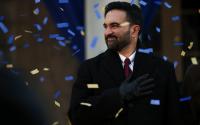Despite opposition from some of their colleagues, 86 evangelical Christian leaders have decided to back a major initiative to fight global warming, saying "millions of people could die in this century because of climate change, most of them our poorest global neighbors."
Among signers of the statement, which will be released in Washington on Wednesday, are the presidents of 39 evangelical colleges, leaders of aid groups and churches, like the Salvation Army, and pastors of megachurches, including Rick Warren, author of the best seller "The Purpose-Driven Life." "For most of us, until recently this has not been treated as a pressing issue or major priority," the statement said. "Indeed, many of us have required considerable convincing before becoming persuaded that climate change is a real problem and that it ought to matter to us as Christians. But now we have seen and heard enough."The statement calls for federal legislation that would require reductions in carbon dioxide emissions through "cost-effective, market-based mechanisms" — a phrase lifted from a Senate resolution last year and one that could appeal to evangelicals, who tend to be pro-business. The statement, to be announced in Washington, is only the first stage of an "Evangelical Climate Initiative" including television and radio spots in states with influential legislators, informational campaigns in churches, and educational events at Christian colleges."We have not paid as much attention to climate change as we should, and that's why I'm willing to step up," said Duane Litfin, president of Wheaton College, an influential evangelical institution in Illinois. "The evangelical community is quite capable of having some blind spots, and my take is this has fallen into that category."Some of the nation's most high-profile evangelical leaders, however, have tried to derail such action. Twenty-two of them signed a letter in January declaring, "Global warming is not a consensus issue." Among the signers were Charles W. Colson, the founder of Prison Fellowship Ministries; James C. Dobson, founder of Focus on the Family; and Richard Land, president of the Ethics and Religious Liberty Commission of the Southern Baptist Convention. Their letter was addressed to the National Association of Evangelicals, an umbrella group of churches and ministries, which last year had started to move in the direction of taking a stand on global warming. The letter from the 22 leaders asked the National Association of Evangelicals not to issue any statement on global warming or to allow its officers or staff members to take a position. E. Calvin Beisner, associate professor of historical theology at Knox Theological Seminary in Fort Lauderdale, Fla., helped organize the opposition into a group called the Interfaith Stewardship Alliance. He said Tuesday that "the science is not settled" on whether global warming was actually a problem or even that human beings were causing it. And he said that the solutions advocated by global warming opponents would only cause the cost of energy to rise, with the burden falling most heavily on the poor. In response to the critics, the president of the National Association of Evangelicals, the Rev. Ted Haggard, did not join the 86 leaders in the statement on global warming, even though he had been in the forefront of the issue a year ago. Neither did the Rev. Richard Cizik, the National Association's Washington lobbyist, even though he helped persuade other leaders to sign the global warming initiative. On Tuesday, Mr. Haggard, the pastor of New Life Church in Colorado Springs, said in a telephone interview that he did not sign because it would be interpreted as an endorsement by the entire National Association of Evangelicals. But he said that speaking just for himself, "There is no doubt about it in my mind that climate change is happening, and there is no doubt about it that it would be wise for us to stop doing the foolish things we're doing that could potentially be causing this. In my mind there is no downside to being cautious."Of those who did sign, said the Rev. Jim Ball, executive director of the Evangelical Environmental Network: "It's a very centrist evangelical list, and that was intentional. When people look at the names, they're going to say, this is a real solid group here. These leaders are not flighty, going after the latest cause. And they know they're probably going to take a little flak."The list includes prominent black leaders like Bishop Charles E. Blake Sr. of the West Angeles Church of God in Christ in Los Angeles, the Rev. Floyd Flake of the Greater Allen A.M.E. Cathedral in New York City, and Bishop Wellington Boone of the Father's House and Wellington Boone Ministries in Norcross, Ga.; as well as Hispanic leaders like the Rev. Jesse Miranda, president of AMEN in Costa Mesa, Calif.The evangelical leaders are meeting Wednesday with senators or their staff members concerned with legislation on energy and the environment. Their letter commends senators who last year passed a resolution by Senators Pete V. Domenici, a Republican, and Jeff Bingaman, a Democrat, both of New Mexico, which called for regulatory measures like a cap and trade program, a system in which industries would buy or trade permits to emit greenhouse gases. In their statement, the evangelicals praised companies like BP, Shell, General Electric, Cinergy, Duke Energy and DuPont that it said "have moved ahead of the pace of government action through innovative measures" to reduce emissions.The television spot links images of drought, starvation and Hurricane Katrina to global warming. In it, the Rev. Joel Hunter, pastor of a megachurch in Longwood, Fla., says: "As Christians, our faith in Jesus Christ compels us to love our neighbors and to be stewards of God's creation. The good news is that with God's help, we can stop global warming, for our kids, our world and for the Lord." The advertisements are to be shown in Arkansas, Florida, Kansas, New Mexico, North Carolina, South Carolina, South Dakota, Tennessee and Virginia.The Evangelical Climate Initiative, at a cost of several hundred thousand dollars, is being supported by individuals and foundations, including the Pew Charitable Trusts, the Hewlett Foundation and the Rockefeller Brothers Foundation. The initiative is one indication of a growing urgency about climate change among religious groups, said Paul Gorman, executive director of the National Religious Partnership for the Environment, a clearinghouse in Amherst, Mass., for environmental initiatives by religious groups.Interfaith climate campaigns in 15 states are pressing for regional standards to reduce greenhouse gases, Mr. Gorman said. Jewish, Roman Catholic and Eastern Orthodox leaders also have campaigns under way.






